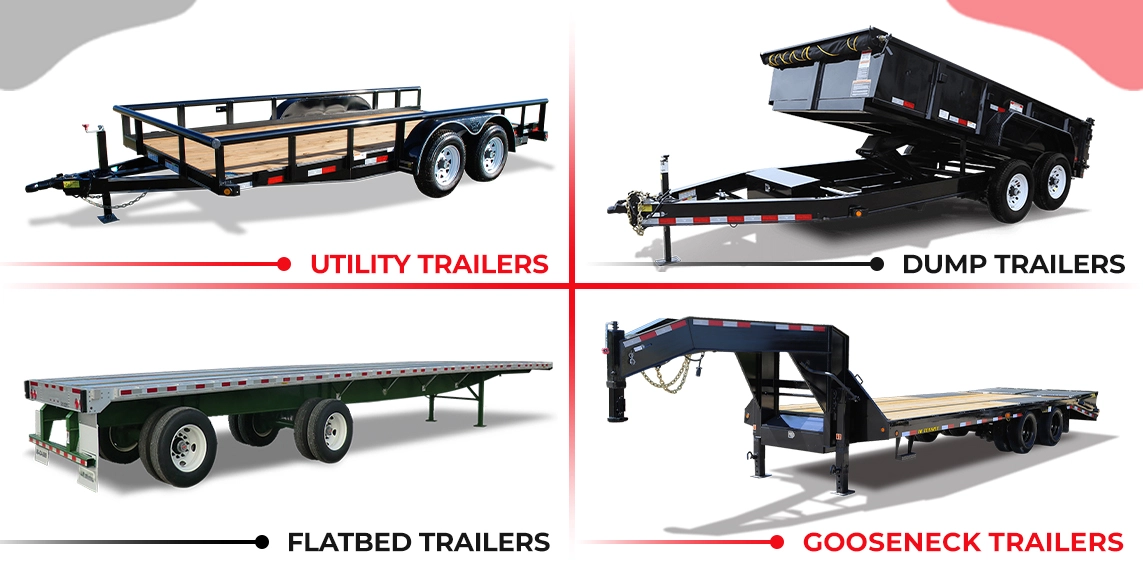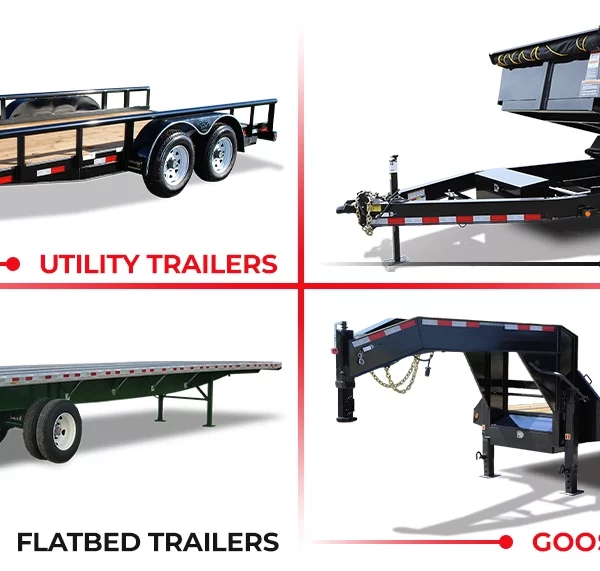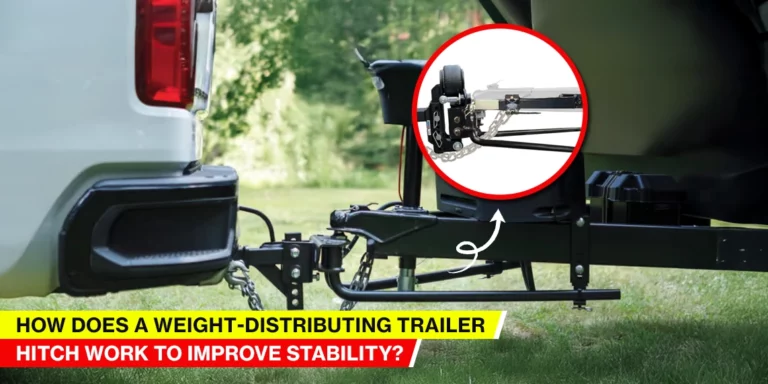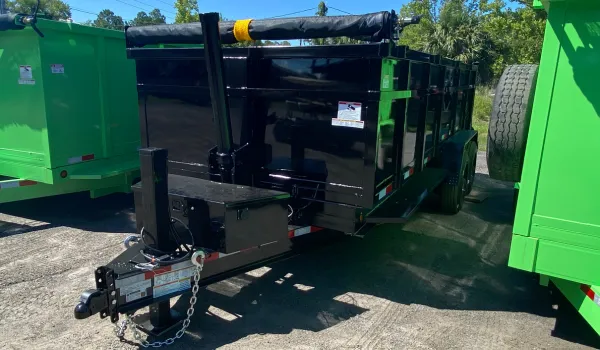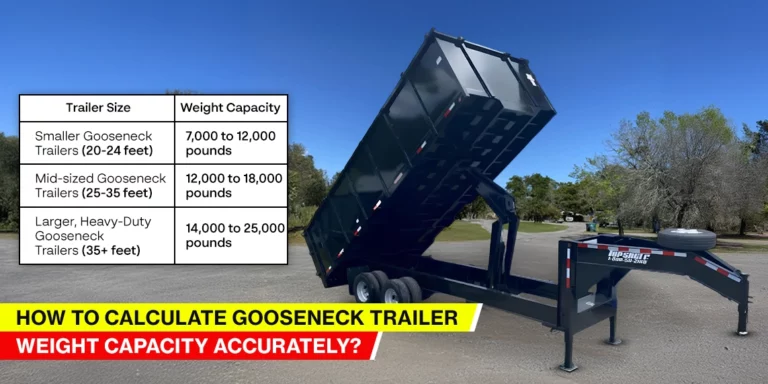Finding the ideal transportation tools is mandatory when you have a hauling plan. Whether you are dealing with business essentials or your precious car, reliability, and road safety are optimum. Here is where trailers come in to help you accomplish the task.
However, there are varied types of trailers for hauling. How to find the ideal one? You must understand your needs and preferences play a massive role. Therefore, there are multiple categories for selecting the perfect trailer for your needs.
You must consider the features, pricing, and weight capacity. Whatever types of trailers you select, it must be reliable, heavy-duty, and offer free movement.
In this comprehensive read, let us explore some heavy haul trailer types ideal for multiple occasions. These trailers can fit your needs however you wish, from livestock trailers to landscaping trailers. The idea is to pick the safest options that function and support seamlessly.
Without further ado, let us learn about the types of hauling trailers to choose from.
What is a Trailer?
Hauling trailers, or simply trailers, are detachable vehicles pulled behind a truck or any automobile for transportation essentials. The essentials may vary from business goods to livestock and home essentials to heavy-duty vehicles.
Trailers come in varied sizes and are selected based on needs. You can opt for enclosed or lightweight utility trailers – with unique benefits and use cases.
Contractors, moving and packing companies, and long-distance hauling guides abundantly utilize trailers. The ideal purpose of picking trailers for moving essentials is protection and cargo capacity.
However, since you are looking for the perfect information about the types of hauling trailers, let us learn about the variety available.
Types of Hauling Trailers for Different Needs
When overhauling, the choice of heavy-duty trailers depends on what you are transporting. Each type of trailer has its specific features and uses, as well as pros and cons.
We have divided the commonly available trailers into three practical categories – enclosed, open, and specialty.
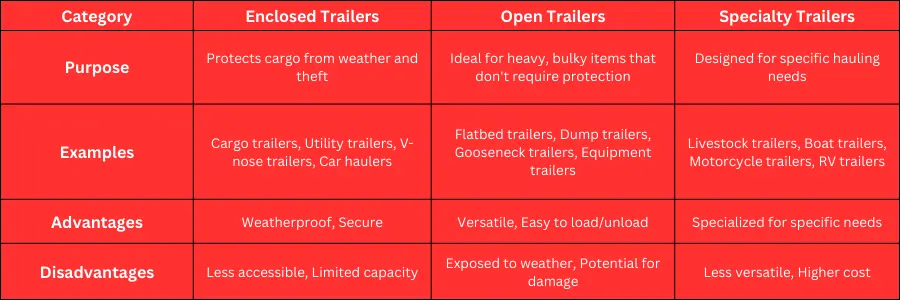
Enclosed Trailers
As the name suggests, enclosed trailers are covered from all sides to offer the ultimate weather protection and safe transport of essentials.
Let us explore the types of enclosed trailers –
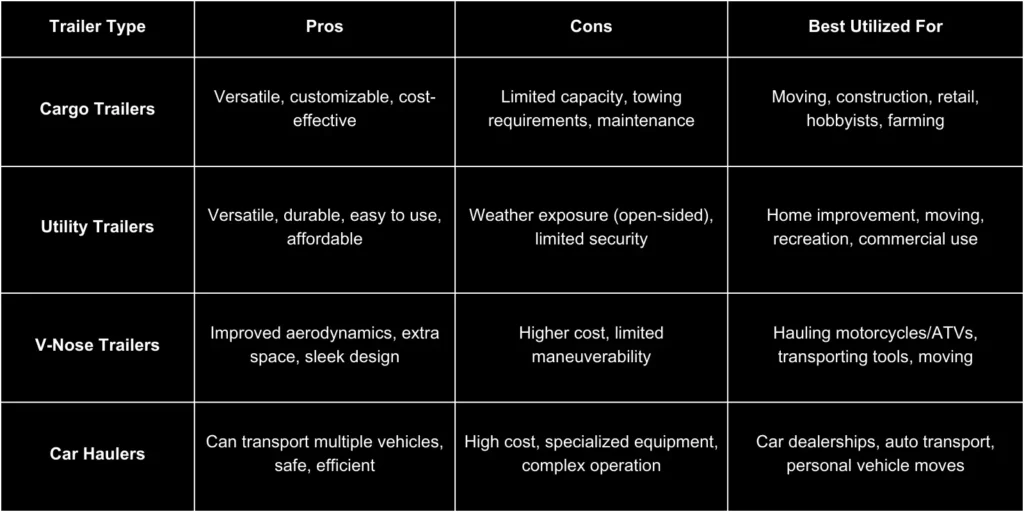
Cargo Trailers
Cargo trailers are the most basic enclosed trailers used for hauling goods. They are available in varied sizes and styles to meet the needs of different businesses and individuals.
Cargo trailers are ideally designed for versatile hauling solutions and can transport varied goods, from construction materials to household items.
It is vital to investigate the various configurations to pick the perfect cargo trailer for your needs. For instance, they have features like doors or ramps that help quickly load and unload.
Pros
- Versatility
Cargo trailers can accommodate multiple cargo sizes and weights and are ideal for large-scale business needs. - Customization
They can be customized with ramps, tie-down points, and interior shelving to suit specific needs. - Cost-Effective
Cargo trailers offer a cost-effective transportation solution, especially for large loads. - Independence
Owning a cargo trailer provides flexibility and independence. It allows you to transport goods on your schedule with professional guidance.
Owning a cargo trailer provides flexibility and independence. It allows you to transport goods on your schedule with professional guidance.
Cons
- Limited Capacity
Compared to larger commercial trucks, cargo trailers have limited cargo capacity. - Towing Requirements
A vehicle with sufficient towing capacity is required to tow a cargo trailer. Additionally, the driver must have the necessary licensing and experience. - Maintenance
Cargo trailers require regular maintenance, including tire checks, brake inspections, and overall structural integrity assessment.
Notable Features
- The size and weight capacity of the trailer will vary depending on the model and towing vehicle.
- The suspension system impacts the ride quality and load-carrying capacity.
- Adequate braking systems are crucial for safe towing.
- The tires must be top-rated for the weight and speed of the trailer.
- Secure tie-down points are essential for preventing cargo shift during transport.
- A ramp or tailgate can facilitate loading and unloading.
- The enclosed feature protects cargo from the weather and offers safe transportation.
Best Utilized For
- Moving: Transporting household goods during a move.
- Construction and Landscaping: Hauling building materials, tools, and equipment.
- Retail and Wholesale: Delivering products to stores or customers.
- Hobbyists and Enthusiasts: Transporting recreational vehicles, boats, or other large items.
- Farmers and Ranchers: Hauling livestock, feed, and agricultural equipment.
It is vital to carefully consider specific needs to choose the ideal cargo trailer for enhanced hauling efficiency and simplified transportation.
Utility Trailers
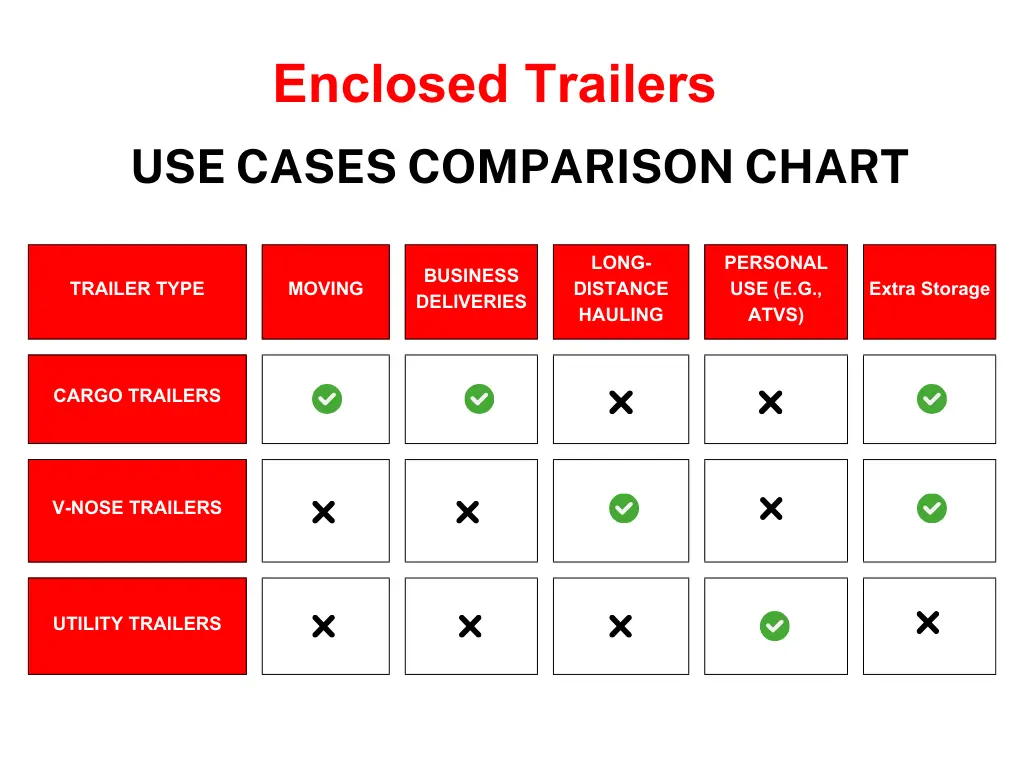
Utility trailers are favored for transporting construction materials and recreational gear. Their versatility and durability make them critical for personal and commercial purposes.
Utility trailers, which have a flatbed design and can be enclosed or open-sided, are typically constructed from steel or aluminum for maximum strength and durability.
The enclosed utility trailer offers flexibility with removable sides for effortlessly hauling different-sized loads. Additionally, the tie-down points prevent shifting during transport.
Pros
- Versatility: These can haul various items, from heavy-duty materials to recreational essentials.
- Durability: They can withstand extreme conditions and heavy loads.
- Easy to Use: The simple design and operation make it ergonomically classic.
- Cost-Effective: A more affordable option compared to enclosed cargo trailers.
Cons
- Weather Exposure:
Open-sided design exposes cargo to the elements. The enclosed variant is a better option. - Limited Security:
Less secure than enclosed utility trailers. The tie-down feature is essential for goods security.
Features
- Available in various sizes to accommodate different needs, from small to large loads.
- The maximum weight a trailer can safely carry.
- Different suspension types, such as leaf springs or torsion axles, affect ride quality and load capacity.
- The type and size of tires impact the trailer’s performance and towing capacity.
- Ramp Gate is a convenient feature for loading and unloading heavy items.
Best Utilized For
- Home Improvement Projects: Hauling construction materials, landscaping supplies, and tools.
- Moving: Transporting furniture, appliances, and boxes during a move.
- Recreational Activities: Towing boats, ATVs, motorcycles, and camping gear.
- Commercial Use: Delivering goods, hauling equipment, and transporting materials for landscaping businesses.
Knowing what it offers helps select the ideal utility trailer to enhance hauling capabilities for varied purposes.
V Nose Trailers
- V-Nose Trailers are a sleek and aerodynamic solution for commercial and residential needs. They are stylish yet efficient in transporting vital belongings.
- The distinctive V-shaped front end offers several advantages over traditional flat-front trailers. Users can experience improved aerodynamics, increased interior space, and a sleek appearance.
Pros
- Improved Aerodynamics:
The V-nose design reduces wind resistance, resulting in better fuel economy and smoother towing. - Increased Interior Space:
The tapered front end provides additional storage space, especially in the nose cone. - Sleek Appearance:
The modern and stylish design enhances the trailer’s overall look while being highly functional. - Durability:
V-nose trailers are constructed from high-quality materials to withstand the rigors of towing.
Cons
- Higher Cost: V-nose trailers are more expensive than traditional flat-front trailers.
- Limited Maneuverability: The tapered front end makes maneuvering in tight spaces challenging, especially for beginners.
Features
- The signature v-shaped nose feature improves aerodynamics and provides additional storage space.
- The enclosed design protects cargo from the elements and provides a secure storage solution.
- They offer side and rear ramp doors for easy access.
- With additional expense, users can elevate the space with LED lighting for improved visibility.
- The 360-degree vents help regulate temperature and prevent moisture buildup.
- Tie-down points securely fasten the cargo to prevent shifting during transport.
Best Utilized For
- Hauling Motorcycles and ATVs: The extra space in the nose cone is perfect for storing these vehicles.
- Transporting Tools and Equipment: Ideal for contractors, landscapers, and other professionals.
- Moving Household Goods: Provides ample space for furniture, appliances, and boxes.
- Camping and Outdoor Recreation: Transporting camping gear, bikes, and other outdoor equipment.
V-nose trailers offer an enhanced hauling experience, making travel more efficient and enjoyable, along with adequate functionality.
Car Haulers
As the name suggests, car hauler trailers are the ultimate vehicle transporters. The design helps transport vehicles and is an essential tool for car dealerships, auto transport companies, and individuals who frequently need to move vehicles.
Car hauler trailers are typically large, heavy-duty trailers with multiple levels to accommodate several vehicles simultaneously. They often feature hydraulic ramps for easy loading and unloading and secure tie-down points to keep vehicles firmly in place during transport.
Pros
- Efficiency: Car haulers can transport multiple vehicles together, saving time and fuel.
- Safety: They can securely transport vehicles, minimizing the risk of damage during transport.
- Flexibility: They transport varied vehicles, including cars, trucks, and SUVs.
Cons
- High Cost: Car hauler trailers are a significant investment. Consider your needs before investing.
- Specialized Equipment: Car haulers require a heavy-duty towing vehicle.
- Complex Operation: Requires specific skills and knowledge to operate car haulers safely.
Features
- Car haulers transport multiple vehicles simultaneously.
- The hydraulic ramps facilitate easy loading and unloading of vehicles.
- The heavy-duty construction helps withstand the weight and stress of various vehicles.
- The wheel chocks prevent vehicles from rolling during loading and unloading.
Best Utilized For
- Car Dealerships: Transporting vehicles between dealerships and auctions.
- Auto Transport Companies: Hauling vehicles for customers.
- Individuals: Transporting multiple vehicles for personal use, such as during a move or for car enthusiasts.
Make an informed decision about whether this type of hauling trailer is right for your specific needs. Since car haulers are expensive, thorough research and comparison of options are necessary.
Open Trailers
As simple as the name suggests, open trailers are wall-free vehicles for transporting essential goods. You can identify an open trailer on a highway, generally pulled by trucks.
The most disadvantageous factor about open trailers is reduced protection. Whatever you are transporting, the lack of walls makes them open to natural elements.
However, if an open trailer is what you need, here are the available options –
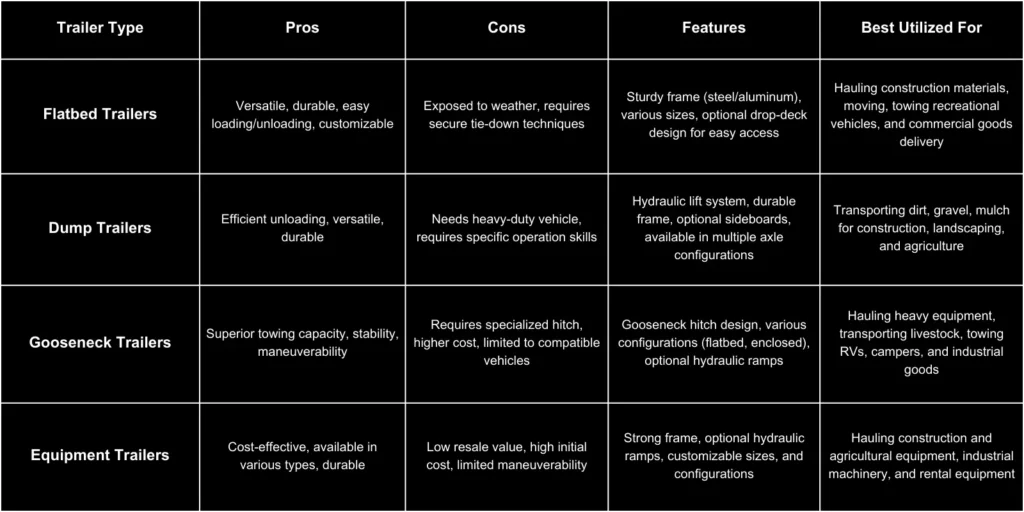
Flatbed Trailers
Flatbed trailers are simple yet highly versatile. They offer a large, open platform for transporting various loads, and they are sought after for both personal and commercial use.
As the name explains, flatbed trailers consist of a flat, open platform with a sturdy frame and wheels. They come in various sizes, from small utility trailers to large commercial trailers.
Pros
- Versatility:
Flatbed trailers can tackle heavy loads and are spacious enough to reduce the number of trips necessary. - Durability:
The building can withstand heavy loads and harsh conditions. Furthermore, the material is sturdy enough to offer expert protection. - Easy to Load and Unload:
The open design and flat deck allow easy access to the cargo. For heavier cargo, users can utilize forklifts and cranes. - Customization:
Flatbed trailers can be customized with features like ramps, side rails, and tie-down points to suit specific needs.
Cons
- Weather Exposure: The cargo is exposed to the elements with the open design and can damage sensitive items.
- Security: Proper tie-down techniques are required to prevent cargo from shifting or falling off.
Features
- Flatbed trailers are available in various sizes to accommodate different load capacities. The trailer can safely carry certain weights with the proper choice of material.
- The frame material is made of steel or aluminum.
- The size and type of tires impact the trailer’s performance and towing capacity.
- Some flatbed trailers have drop deck design that allows ground-level loading, offering easier access.
Best Utilized For
- Construction and Landscaping Material: Hauling construction materials, landscaping supplies, and building equipment.
- Moving: Transporting furniture, appliances, boxes, and even lightweight vehicles.
- Recreational Activities: Towing boats, ATVs, motorcycles, camping gear, and large vehicles.
- Commercial Use: Delivering goods, hauling equipment, and transporting materials for personal needs.
Flatbed trailers are a typical choice for users with large-scale transportation needs. The perfect length and weight capacity offer uncompromised heavy lifting.
Dump Trailers
Dump trailers transport and unload bulk materials, such as dirt, gravel, sand, and mulch. They aid in construction, landscaping, and agriculture transportation.
A dump trailer features a hydraulically operated bed that can be tilted to unload cargo and raised to a high angle for efficient material dumping.
Pros
- Efficiency: You can quickly and comfortably unload large bulk materials with dump trailers.
- Versatility: It can be used to transport a range of materials that are easy to dump, so transporting a car may not be an option.
- Durability: The material is premium and can withstand heavy loads and harsh conditions.
Cons
- Specialized Equipment: A heavy-duty towing vehicle is required.
- Complex Operation: It demands specific skills and knowledge for safe operation.
Features
- Dump trailers have a hydraulic lift system. The bed can be raised and lowered, which facilitates loading and unloading.
- It is a heavy-duty trailer, and the construction can withstand the weight and stress of heavy loads.
- Dump trailers are available in various sizes to accommodate different needs.
- There are multiple axle configurations – single-axle, tandem-axle, or tri-axle, to handle different load capacities.
- The optional side boards contribute to preventing material spillage.
Best Utilized For
- Construction: Transporting dirt, gravel, sand, and other building materials.
- Landscaping: Hauling mulch, soil, and rock.
- Agriculture: Transporting grain, feed, and other agricultural products.
Understanding dump trailer purposes and use cases is mandatory and helps in informed decision-making.
Gooseneck Trailers
Gooseneck trailers are a powerful and versatile hauling solution. They offer significant advantages over traditional bumper-pull trailers.
The unique design, where the trailer hitch connects directly to the truck bed, provides exceptional weight distribution, enhancing stability and maneuverability.
Pros
- Superior Towing Capacity:
The direct connection to the truck frame helps transfer more weight. They are ideal for hauling heavy-duty loads such as construction equipment, livestock, and large recreational vehicles. - Enhanced Stability
The gooseneck design reduces sway and improves handling, especially when towing long or heavy loads. The increased stability contributes to a smoother and safer towing experience. - Superior Maneuverability
Gooseneck trailers offer tighter turning radius and easier backing into tight spaces. They are ideal for urban environments and construction sites.
Cons
- Specialized Hitch: A specific gooseneck hitch must be installed on your truck.
- Higher Initial Cost: Gooseneck trailers and hitches are more expensive than bumper-pull setups.
- Limited Vehicle Compatibility: Not all trucks are compatible with gooseneck hitches, specifically smaller pickup trucks.
Features
- Gooseneck Hitches are unique and connect directly to the truck bed.
- To suit different needs, the trailer is available in various configurations, like flatbed, deck-over, and enclosed designs.
- While the hydraulic ramps are optional, the feature makes it easier for loading and unloading.
Best Utilized For
- Hauling Heavy Equipment: Construction equipment, farming machinery, and large industrial equipment.
- Transporting Livestock: Safely transporting livestock over long distances.
- Recreational Vehicles: Towing large RVs, campers, and boats.
- Commercial Hauling: Transporting heavy goods for businesses and industries.
Understanding the pros, cons, and features of gooseneck trailers is vital to determine if they are the ideal option for your hauling needs.
Equipment Trailers
Trailers transport heavy machinery, construction equipment, and other large, bulky items. They are essential for contractors, landscapers, and other professionals who move equipment from one job site to another.
Pros
- Cost-effective:
It is a budget-friendly option in comparison and is used in multiple projects. - Variety:
Equipment trailers are available in enclosed and open versions, and users choose as per preference. - Premium Material:
Typically, branded equipment trailers are built with sturdy material and can withstand the weight and stress of heavy equipment. The robust frame contributes to durability and cargo protection.
Cons
- Resale Value:
Equipment trailer resale value is low to none and depends on various factors. While it works well for businesses, individuals may struggle to utilize the vehicle. - Hydraulic Options:
The vehicle is available with and without hydraulics. However, the hydraulics option is difficult to find in the present market. - High Initial Cost:
Equipment trailers can be a significant investment, especially for larger models. - Specialized Towing Requirements:
A heavy-duty towing vehicle with sufficient power and braking capacity is critical.
Limited Maneuverability: It is difficult to maneuver in tight spaces and significantly larger trailers.
Features
- The hauling capacity is massive, and it can withstand the weight and stress of heavy equipment.
- Equipment trailers have a strong frame and ensure durability and longevity.
- The hydraulic ramps facilitate easy loading and unloading of heavy equipment.
- The large load capacity can accommodate a range of equipment sizes and weights.
- Users can avail of customizable options and explore sizes and configurations to meet specific needs.
Best Utilized For
- Construction and Landscaping: Hauling excavators, bulldozers, and other heavy machinery.
- Agriculture: Transporting farm equipment, tractors, and harvesting machinery.
- Industrial Use: Moving massive industrial equipment and machinery.
- Rental Companies: Transporting rental equipment to and from job sites.
We suggest carefully considering your specific needs before selecting an equipment trailer for a seamless operation.
Specialty Trailers
Specialty trailers are generic trailers designed for unique hauling purposes. Let us learn about the available options –
Livestock trailers
Livestock trailers are designed to transport animals such as cattle, horses, sheep, and pigs. They are essential for farmers, ranchers, and animal transportation companies.
Types of Livestock Trailers
- Gooseneck Livestock Trailers offer superior weight distribution, enhanced stability, and better maneuverability. However, this trailer type requires a gooseneck hitch, limiting compatibility with particular trucks. It is used for transporting large animals like cattle and horses over long distances.
- Bumper-pull livestock Trailers also called drag or tag-along trailers, are easier to tow and more affordable than gooseneck trailers. However, they have limitations in towing capacity and stability compared to gooseneck trailers. Bumper-pull trailers are ideal for transporting smaller animals like sheep, pigs, and goats over shorter distances.
- Stock Trailers are another range of livestock trailers. They have a simple design, are easy to load and unload, and are affordable. The drawbacks are limited protection from the elements and low comfort for animals. They are perfect for transporting livestock short distances, especially in rural areas.
- Horse Trailers are designed specifically for horses, providing comfort and safety. However, more specialized horse trailers can be more expensive. You can customize the flooring, ventilation systems, and individual stalls. It is perfect for transporting horses to and from shows, races, and breeding farms.
The majority of livestock trailers is sturdy and offer adequate ventilation to ensure fresh air and prevent heat stress. They also come equipped with tie-down points to keep animals safe and prevent injuries.
Suppose your needs suffice and you have the budget. In that case, we advise investing in non-slip flooring, divider panels, and hydraulic ramps for comfortable animal transport.
Boat Trailers
Boat trailers are specifically designed to transport boats and other watercraft. They come in various sizes and configurations to accommodate different types of boats, from small canoes to large yachts.
Types of Boat Trailers
- Single-axle Boat Trailers are simple, easy to maneuver, and more affordable. While they have limited weight capacity, it is ideal for small-sized boats. Furthermore, you can experience features like bunk-style or roller design and manual or electric winch.
- Tandem-axle Boat Trailers have increased weight capacity, better stability, and a smoother ride. The design can be complex and expensive. They also offer a bunk-style or roller design and manual or electric winch.
- Over-axle Boat Trailers have lower loading height, better weight distribution, and improved stability. These are an expensive variant.
- Boat Trailers can withstand the weight and stress of watercraft. Their corrosion-resistant design protects them from prolonged water exposure. Additionally, the bunk style seamlessly accommodates the boat hull. Swivel Jacks are available for easy maneuvering and launching the boat.
These trailers are best used for –
- Recreational Boating: Transporting fishing boats, pontoon boats, and small watercraft.
- Commercial Fishing: Hauling commercial fishing boats and equipment.
- Marine Industry: Transporting boats for sales, repairs, and storage.
When selecting a boat trailer, learn to take proper care and ensure safe and efficient transportation.
Motorcycle Trailers
Motorcycle trailers help transport motorcycles safely and securely. They are essential for motorcycle enthusiasts, dealers, and anyone who needs to transport their motorcycle to different locations.
Types of Motorcycle Trailers
- Single-motorcycle trailers have a simple design, easy to maneuver, and are affordable. They are ideal for relocating one motorcycle. You can experience adjustable wheel chocks and tie-down points.
- Dual-motorcycle trailers are efficient for transporting two motorcycles at once. They have similar adjustable wheel chocks and tie-down points.
- Enclosed Motorcycle Trailers offer elevated protection from weather and theft when transporting vehicles. They are expensive and less maneuverable. However, the ventilation system balances out the elevated cost concern.
Best Utilized For
- Motorcycle Enthusiasts: Transporting motorcycles to track days, rallies, or weekend rides.
- Motorcycle Dealers: Transporting motorcycles between dealerships and customers.
- Motorcycle Mechanics: Transporting motorcycles to and from repair shops.
We recommend selecting the right motorcycle trailer and following proper loading and securing techniques for safe and efficient transport.
RV Trailers
RV trailers, or recreational vehicle trailers, offer a versatile and comfortable way to explore the world. They provide a self-contained living space with amenities like beds, kitchens, bathrooms, and living areas.
Types of RV Trailers
- Travel Trailers are compact, easy to tow, and affordable. While they have limitations like space and amenities, they are perfect for short trips.
- Fifth-wheel trailers offer superior stability, larger living space, and more luxurious features. However, this variant demands a fifth-wheel hitch, limiting compatibility with specific trucks. They are perfect for extended stays, full-time living, and those seeking a spacious and comfortable RV experience.
- Toy Haulers combine living quarters with a garage for toys like motorcycles, ATVs, or bicycles. They have a complex design and, hence, are expensive. They are ideal for adventure enthusiasts who want to bring their toys on their travels.
Features of RV Trailers
- They have spacious interiors with comfortable seating, dining areas, and sleeping accommodations.
- RV trailers have a refrigerator, stove, oven, microwave, and ample storage.
- Bathroom sections are equipped with a toilet, shower, and sink.
- Sleeping accommodations like bunk beds, queen-size beds, and convertible furniture are available.
- Heating and air conditioning features ensure comfort in various weather conditions. In addition, the water system offers fresh and waste water tanks for self-sufficiency.
- Electrical System provides power for lights, appliances, and electronics.
- Propane System powers appliances like stoves, water heaters, and refrigerators.
When choosing an RV trailer, consider the size, weight, towing capacity, and desired amenities. We suggest researching different models, focusing on features and amenities, to find the perfect RV for your needs.
Critical Factors in Choosing the Perfect Trailer
Selecting the right trailer is crucial for efficient and safe transportation. Several key factors must be considered to ensure the trailer meets your specific preferences –
Payload Capacity
The payload capacity determines the maximum weight the trailer can carry. It is essential to consider the weight of your cargo, including additional equipment or accessories. Overloading a trailer leads to serious safety issues like tire blowouts, brake failure, and structural damage.
Factors affecting payload capacity
- Trailer’s Gross Vehicle Weight Rating (GVWR): It is the maximum weight of the trailer, including its weight and the weight of the cargo.
- Tow Vehicle’s Towing Capacity: Your vehicle must be capable of safely towing the trailer and its load.
- Axle Configuration: More axles can support heavier loads.
Towing Capacity
The vehicle’s towing capacity is the maximum weight it can safely tow. It is critical to choose a trailer within your vehicle’s towing capacity to avoid overloading and potential accidents.
Factors affecting towing capacity
- Vehicle’s Gross Vehicle Weight Rating (GVWR): The maximum weight of the car, including its weight, passengers, and cargo.
- Engine Power: A powerful engine is essential for towing heavy loads.
- Transmission: A heavy-duty transmission is required to handle the stress of towing.
- Brakes: Adequate braking power is crucial for safe towing.
Dimensions
The dimension includes its length, width, and height, which impacts its maneuverability, storage, and legal requirements. Consider the following –
- Overall Length: Longer trailers require more space for storage and maneuvering.
- Overall Width: Wider trailers require special permits for road transport.
- Overall Height: Taller trailers limit access to certain areas, such as low bridges or parking garages.
Type of Cargo
The cargo type influences the type of hauling trailer you need. Different types of trailers are designed to accommodate specific types of cargo. While we have already learned about the various kinds of trailers available in the market, let us revisit our options –
- Cargo Trailers: Versatile for transporting varied goods, including furniture, appliances, and construction materials.
- Utility Trailers: Ideal for hauling heavy equipment, landscaping supplies, and construction materials.
- Flatbed Trailers: These are suitable for transporting large, heavy items that cannot be enclosed, such as lumber, steel, and machinery.
- Gooseneck Trailers: Offer superior towing capacity and stability, making them ideal for heavy-duty hauling.
- Livestock Trailers: Designed to transport animals safely and comfortably.
- Boat Trailers: Specifically designed to transport boats of various sizes.
- RV Trailers: Provide self-contained living quarters for recreational travel.
Budget
Budget plays a significant role in determining the type and size of trailer you can afford. Consider the initial purchase price, ongoing maintenance costs, and insurance premiums.
Additionally, keep these pointers handy when finalizing the trailer –
- Older trailers require more maintenance and repairs.
- Tire condition is crucial. Ensure the tires are in good condition and properly inflated.
- Check the brakes for proper function and wear.
- Ensure all lights are working efficiently.
- Verify that the hitch and coupler are in good condition and properly secured.
After all, opting for a trailer that offers durability and safety while meeting specific needs and requirements is vital.
Tips on How to Determine the Right Trailer Size for Specific Hauling Needs
While you are out there looking for the perfect trailer, here are some takeaway tips to help you determine the optimal size for your specific needs –
Assess Your Cargo
- Weight: Determine the weight of your heaviest load.
- Dimensions: Measure your most oversized item’s length, width, and height.
- Shape: Consider the shape of your cargo and whether it will fit on a flatbed or enclosed trailer.
Consider Your Towing Vehicle
- Towing Capacity: Check your vehicle’s owner’s manual to determine its maximum towing capacity.
- Payload Capacity: Ensure the vehicle can handle the weight of the trailer and its load.
- Hitch Type: Determine whether you need a ball or a fifth-wheel hitch.
Maneuverability and Storage
- Parking Space: Consider the size of your driveway or garage and the available storage space.
- Turning Radius: A larger trailer requires space to maneuver and is a primary factor to consider.
- Traffic Laws and Regulations: Check local trailer length and width restrictions regulations.
Budget
- Initial Purchase Cost: Larger trailers typically cost more.
- Maintenance and Operating Costs: Consider fuel consumption, tire replacement, and insurance.
Future Needs
- Anticipate Growth: Consider future hauling needs and select a trailer, accommodating potential growth.
- Versatility: A versatile trailer handles a variety of loads and is a cost-effective decision.
Some Additional Tips
- Renting a trailer can be a cost-effective option for occasional hauling needs.
- Seek advice from trailer rental companies or RV dealers.
- Always prioritize safety when loading, towing, and unloading your trailer.
- Keep your trailer in good condition to ensure safe and reliable operation.
Opting for the Perfect Trailers for Efficient Hauling
What size trailer do I need to haul a truck? How can I transport my livestock in a trailer? – We believe this comprehensive guide has covered similar concerns.
We have explored the nitty-gritty details of the different kinds of trailers available in the market. The read here explains all sorts of trailers and their use cases – from enclosed goosenecks to open flat beds. The ideal trailer depends on your needs and the cargo you wish to transport.
Selecting the perfect trailer from multiple options can be cumbersome. There are several factors to consider and concerns to analyze—we recommend active decision-making.
The thorough read explains each types of hauling trailers, design, features, pros and cons, making it easier to align with your needs. Actively participate in research before investing. For further aid, we recommend consulting with professionals.
At Top Shelf Trailers, we cater to your varied trailer needs and offer premium-quality products directly from our manufacturing house. We believe in doorstep delivery and professional guidance for an enhanced hauling experience.
To learn more about the different types of trailers we offer, visit Top Shelf Trailers!

